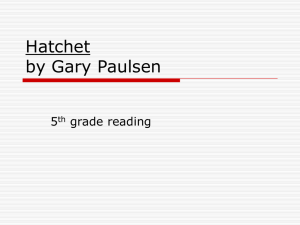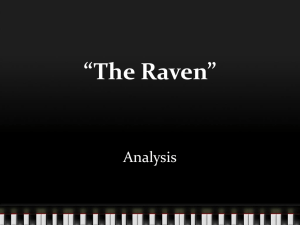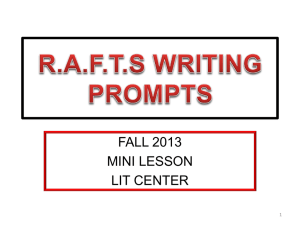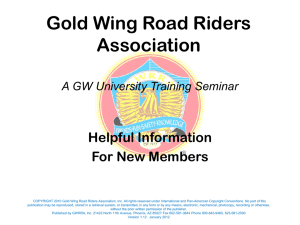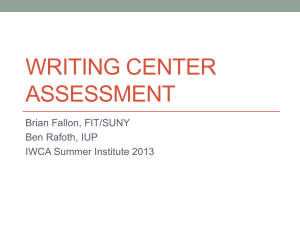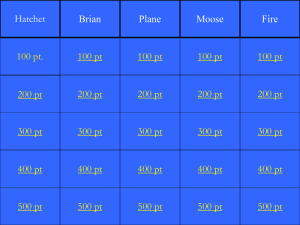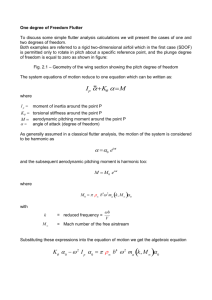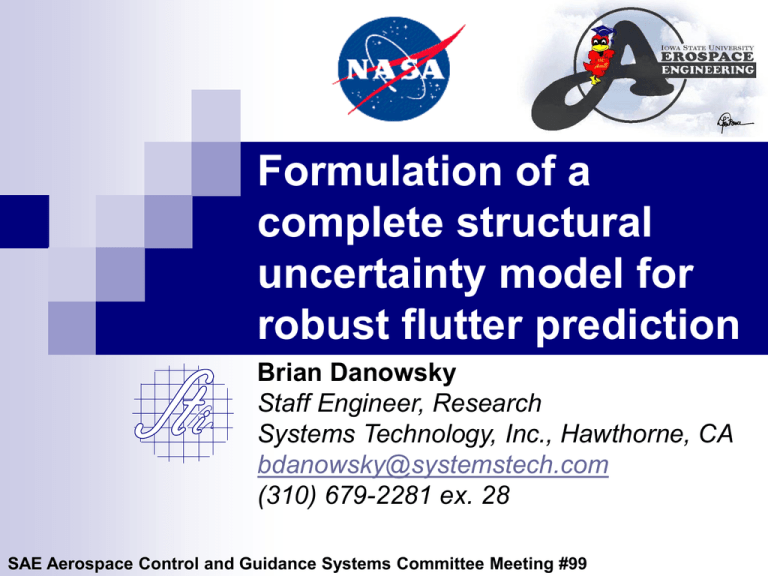
Formulation of a
complete structural
uncertainty model for
robust flutter prediction
Brian Danowsky
Staff Engineer, Research
Systems Technology, Inc., Hawthorne, CA
bdanowsky@systemstech.com
(310) 679-2281 ex. 28
SAE Aerospace Control and Guidance Systems Committee Meeting #99
Acknowledgement
Iowa State University
Dr. Frank R. Chavez
NASA Dryden Flight Research Center
Marty Brenner
NASA GSRP Program
Copyright © Brian Danowsky, 2004. All rights reserved
Outline
Introduction to the Flutter Problem
Purpose of Research
Wing Structural Model
Application of Unsteady Aerodynamics
Complete Aeroelastic Wing Model
Review of Robust Stability Theory
Application of the Allowable Variation in the
Freestream Velocity
Application of Parametric Uncertainty in the Wing
Structural Properties
Conclusions and Discussion
Copyright © Brian Danowsky, 2004. All rights reserved
Introduction to The Flutter Problem
Coupling between Aerodynamic Forces and
Structural Dynamic Inertial Forces
Can lead to instability and possible structural
failure.
Flight testing is still an integral part in estimating
the onset of flutter.
Current flutter prediction methods only account
for variation in flutter frequency alone, and do
not account for variation in structural mode
shape.
VIDEO
Copyright © Brian Danowsky, 2004. All rights reserved
Purpose of Research
Flutter problem can be very sensitive to structural
parameter uncertainty.
Flutter Points: Mach Number vs. Altitude
37000
36000
35000
34000
33000
32000
31000
30000
Altitude, ft.
29000
28000
27000
26000
25000
24000
23000
22000
21000
20000
19000
18000
0.3
0.4
0.5
0.6
0.7
0.8
Mach Number
Copyright © Brian Danowsky, 2004. All rights reserved
0.9
Wing Structural Model
Governing Equation of Unforced Motion
for Wing
Modal Analysis: mode shapes and
frequencies
Copyright © Brian Danowsky, 2004. All rights reserved
Wing Structural Model
Copyright © Brian Danowsky, 2004. All rights reserved
Application of the Unsteady
Aerodynamics
Aerodynamic Forces
Vector of panel forces
*Aerodynamic forces calculated in
different coordinates than structure
Vector of non-dimensional
pressure coefficients
Copyright © Brian Danowsky, 2004. All rights reserved
Application of the Unsteady
Aerodynamics
Aerodynamic force: Pressure Coefficient
cP = vector of panel pressure
coefficients
w = vector of panel local
downwash velocities
Determined from the unsteady
doublet lattice method
AIC(k,Mach) = Aerodynamic
Influence Coefficient matrix
(complex)
Copyright © Brian Danowsky, 2004. All rights reserved
Complete Aeroelastic Wing Model
Since the structural model and the aerodynamic
model have been established the complete
model can be constructed
Representation of the Aeroelastic Wing
Dynamics as a First Order State Equation
Needed
to Apply Robust Stability (m analysis)
The dynamic state matrix will be a function of one
variable (U)
Tailored for subsequent control law design, if desired
Copyright © Brian Danowsky, 2004. All rights reserved
Complete Aeroelastic Wing Model
Coordinate Transformation
Aerodynamic
force calculations in a different
domain than structural
Modal Domain Approximation
Significantly
reduce the dimension of the
mass and stiffness matrices
h = Hh
Matrix of retained mode shapes
Copyright © Brian Danowsky, 2004. All rights reserved
Complete Aeroelastic Wing Model
Forced Aeroelastic Equation of Motion:
Flutter prediction can now be done: v-g method
Not suitable to be cast as a 1st order state
equation
AIC
is not real rational in reduced frequency (k)
Copyright © Brian Danowsky, 2004. All rights reserved
Complete Aeroelastic Wing Model
Unsteady Aerodynamic Rational Function
Approximation (RFA)
If s = jw, then p = jk
With constant Mach number,
approximate as:
Copyright © Brian Danowsky, 2004. All rights reserved
Complete Aeroelastic Wing Model
Atmospheric Density Approximation
Direct
relationship between atmospheric
density and freestream velocity
Coefficients are a function of Mach number
Based on the 1976 standard atmosphere
model
Copyright © Brian Danowsky, 2004. All rights reserved
Complete Aeroelastic Wing Model
State Space Representation
State
First
Vector
Order System
Only a function of
velocity for a fixed
constant Mach
number
Copyright © Brian Danowsky, 2004. All rights reserved
Nominal Flutter Point Results
V-g Flutter Point
(no AIC or density approximation)
Flutter Point calculated using
stability of ANOM
Copyright © Brian Danowsky, 2004. All rights reserved
Nominal Flutter Point
Copyright © Brian Danowsky, 2004. All rights reserved
Model with Uncertainty
The flutter problem can be sensitive to
uncertainties in structural properties
A model accounting for uncertainty in structural
properties is desired
An allowable variation to velocity must be
accounted for to determine robust flutter
boundaries due to uncertainty in structural
properties
Robust flutter margins are found using Robust
Stability Theory (m analysis)
Copyright © Brian Danowsky, 2004. All rights reserved
Robust Stability
The Small Gain Theorem- a closed-loop
feedback system of stable operators is
internally stable if the loop gain of those
operators is stable and bounded by unity
Copyright © Brian Danowsky, 2004. All rights reserved
Robust Stability
The Small Gain Theorem
Copyright © Brian Danowsky, 2004. All rights reserved
Robust Stability
m: The Structured Singular Value
- With a known uncertainty structure a less
conservative measure of robust stability can
be implemented
stable if and only if
Copyright © Brian Danowsky, 2004. All rights reserved
Application of the Allowable Variation in
the Freestream Velocity
Allowable variation to velocity must be accounted for to
determine robust flutter boundaries due to uncertainty in
structural properties.
System can be formulated with a stable nominal
operator, M, and a variation operator, D.
M - constant nominal operator representing the wing
dynamics at a stable velocity
D – variation operator representing the allowable
variation to the nominal velocity
Nominal flutter point can be determined using this M-D
framework which will match that found previously.
Copyright © Brian Danowsky, 2004. All rights reserved
Application of the Allowable Variation in
the Freestream Velocity
Velocity representation
Applied to Aeroelastic Equation of motion
Copyright © Brian Danowsky, 2004. All rights reserved
Application of the Allowable Variation in
the Freestream Velocity
Formulate M-D model with polynomial
dependant uncertainty defined
Standard
method to separate polynomial
dependant uncertainty (Lind, Boukarim)
Introduce new feedback signals
Copyright © Brian Danowsky, 2004. All rights reserved
Nominal Flutter Margin
Only dV variation is considered
Copyright © Brian Danowsky, 2004. All rights reserved
Application of Parametric Uncertainty in
the Wing Structural Properties
Must expand M-D model to account for
uncertainty in structural parameters
Account for uncertainty in structural mode
shape and frequency
Uncertain elements are plate structural
properties:
Copyright © Brian Danowsky, 2004. All rights reserved
Application of Parametric Uncertainty in
the Wing Structural Properties
Define uncertainty in any modulus (elasticity or
density)
Structural mode shapes and frequencies are
dependant on this:
derivatives calculated analytically (Friswell)
Copyright © Brian Danowsky, 2004. All rights reserved
Application of Parametric Uncertainty in
the Wing Structural Properties
Apply J to Aeroelastic Equation of motion:
Note: 2nd order dJ2
terms are neglected
Copyright © Brian Danowsky, 2004. All rights reserved
Application of Parametric Uncertainty in
the Wing Structural Properties
Formulate M-D model
DdV = dVI
DdJ = dJI
Copyright © Brian Danowsky, 2004. All rights reserved
Robust Flutter Margin
Determination
Uncertainty operator, D, a function of 2
parameters (dV, dJ)
Calculation of m is necessary
Copyright © Brian Danowsky, 2004. All rights reserved
Robust Flutter Margin
Determination
Formulate frequency dependant model
1/s
s = jw
Copyright © Brian Danowsky, 2004. All rights reserved
Robust Flutter Margin Results
Copyright © Brian Danowsky, 2004. All rights reserved
Robust Flutter Margin Results
30% uncertainty in
G*
Copyright © Brian Danowsky, 2004. All rights reserved
Robust Flutter Margin Results
30% uncertainty in
E*
Copyright © Brian Danowsky, 2004. All rights reserved
Conclusions and Discussion
Complete Model
State Space Model
Direct mode shape and frequency dependence on structural
parameters
Analytical derivatives avoiding computational inaccuracies
Aerodynamic RFA
Flutter point instability matches V-g method
Well-Suited for Subsequent Control Law Design if Desired
Method can be easily applied to a much more complex
problem (i.e. entire aircraft)
Copyright © Brian Danowsky, 2004. All rights reserved
Major Contributions of this Work
Inclusion of Mode Shape Uncertainty
Dependence of Mode Shape and Frequency
Traditionally only frequency uncertainty is considered
The uncertainty in both the structural mode shape and mode
frequency are dependant on a real parameter (E*,G*)
The individual mode shapes and frequencies are not
independent of one another
Complete M-D model with Uncertainty
Well suited for subsequent control law design taking structural
parameter uncertainty into account (Robust Control)
Copyright © Brian Danowsky, 2004. All rights reserved
Areas of Future Investigation
Abnormal flutter point
Instability
reached with a decrease in velocity
Abnormality due to Mach number dependence
Wing created that would flutter at reasonable altitude
Limited range of valid velocities
Due
to Mach number dependence and standard
atmosphere
Copyright © Brian Danowsky, 2004. All rights reserved
Questions?
Copyright © Brian Danowsky, 2004. All rights reserved

